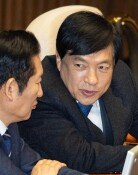[Opinion] Dignity of a Nation
Although the word Pyobyeon is used as a negative word these days, it is actually positive. According to Zhou-I, an ancient Chinese text also known as the Book of Changes, the word Pyobyeon suggests throwing away ancient customs and bravely correcting the mistakes by a noble man as if a leopard sheds fur in autumn. On the contrary, Hyeokmyeon indicates changing the color of the face by someone with a small mind.
Japanese Prime Minister Shinzo Abe declared after he took office last September that he would embrace centrists, diluting his conservative hue. Although some Liberal Democratic Party (LDP) lawmakers claimed that Japan should go nuclear, Abe opposed it and said that he would succeed the apology made in 1993 by then-chief cabinet secretary Yohei Kono in regard to mobilizing women for sexual slavery and the apology in 1995 by then Japanese Prime Minister Tomiichi Murayama in regard to colonial rule and invasion. In response, the Asahi Shimbun said, Is a noble man changing his coat? However, Abes approval rating plummeted from 70 percent to 40 percent as conservative forces protested against his moderate stance and some of his cabinet members were questioned on their competence.
This year, Abe declared that he will show his own color. He even showed confidence in winning the upcoming July upper house elections, describing former Prime Minister Junichiro Koizumi as a deadly poison with many side effects while describing himself as herbal medicine which gradually shows its effect. Moreover, he denied the mobilization of women for sexual slavery during the Japanese occupation, changing his facial color once again. In this regard, some LDP lawmakers even point out that Abe who suddenly emerged as the prime minister without assuming key ministerial positions was incompetent to become a prime minister.
Recently, The Dignity of a Nation, a book written by Japanese math professor Fujiwara Masahiko, has become a best seller. In the book, Fujiwara criticizes Japans double standards, saying the whole nation is outraged by the 17 Japanese abducted by North Korea while ignoring the fact that some 200,000 women were forced to become sex slaves by Japan. Moreover, recently, it was revealed that Abe said in 1990 when he served as the secretary general of an organization of conservative right wing lawmakers that, I think the comfort women issue is just part of their life, and it is related to Koreas prostitution culture. How can a nation maintain its dignity with those remarks lacking commonsense and universality?
Lee Dong-kwan, Editorial Writer, dklee@donga.com




![“잠만 자면 입이 바싹바싹”…잠들기 전에 이것 체크해야 [알쓸톡]](https://dimg.donga.com/c/138/175/90/1/wps/NEWS/IMAGE/2026/02/23/133404749.3.jpg)


